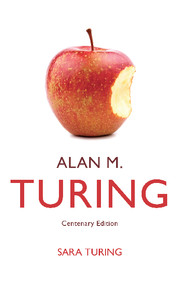Book contents
- Frontmatter
- Contents
- Foreword to the Centenary Edition
- Preface to the First Edition
- Foreword to the First Edition
- Part One Mainly Biographical
- 1 Family Background
- 2 Childhood and Early Boyhood
- 3 At Sherborne School
- 4 At Cambridge
- 5 At the Graduate College, Princeton
- 6 Some Characteristics
- 7 War Work in the Foreign Office
- 8 At the National Physical Laboratory, Teddington
- 9 Work with the Manchester Automatic Digital Machine
- 10 Broadcasts and Intelligent Machinery
- 11 Morphogenesis
- 12 Relaxation
- 13 Last Days and Some Tributes
- Part Two Concerning Computing Machinery and Morphogenesis
- My Brother Alan
- Bibliography
1 - Family Background
Published online by Cambridge University Press: 05 April 2012
- Frontmatter
- Contents
- Foreword to the Centenary Edition
- Preface to the First Edition
- Foreword to the First Edition
- Part One Mainly Biographical
- 1 Family Background
- 2 Childhood and Early Boyhood
- 3 At Sherborne School
- 4 At Cambridge
- 5 At the Graduate College, Princeton
- 6 Some Characteristics
- 7 War Work in the Foreign Office
- 8 At the National Physical Laboratory, Teddington
- 9 Work with the Manchester Automatic Digital Machine
- 10 Broadcasts and Intelligent Machinery
- 11 Morphogenesis
- 12 Relaxation
- 13 Last Days and Some Tributes
- Part Two Concerning Computing Machinery and Morphogenesis
- My Brother Alan
- Bibliography
Summary
The Turing family is of Norman extraction and the family tree goes back to 1316 AD, the family motto being Fortuna audentes Juvat. Having arrived in Scotland the members settled in Angus in a barony of that name, whence they removed to Aberdeenshire early in the fourteenth century and came into possession of Foveran, which remained the family seat until recent times. The name was variously spelled Turyne, Thuring, Turin, Turing. William Turin received the honour of knighthood from James VI of Scotland (James I of England) and thereafter Sir William added the final “g” to the name.
John Turing of Foveran was created a baronet by Charles I in 1639 for loyal service, and was at the battle of Worcester; but his loyalty cost him the loss of lands which had been in the family for 300 years. Records show Turings holding positions of trust and responsibility in the County of Aberdeen.
By the eighteenth century some Turings were venturing further a field. Thus Sir Robert Turing (Bart.), born in 1744, was a doctor and amassed a considerable fortune in the East Indies and then retired to Banff in Scotland where he made himself very useful and popular. One kinsman in the Honourable East India Company took part in the defence of Seringapatam. Others in the nineteenth century lived in Holland; two, father and son, were successive British Consuls in Rotterdam. Some of their descendants have now become domiciled in Holland. Alan's great grandfather, presumably through this Dutch connection, had some occupation in Batavia, maybe in some shipping concern.
- Type
- Chapter
- Information
- Alan M. TuringCentenary Edition, pp. 3 - 8Publisher: Cambridge University PressPrint publication year: 2012

